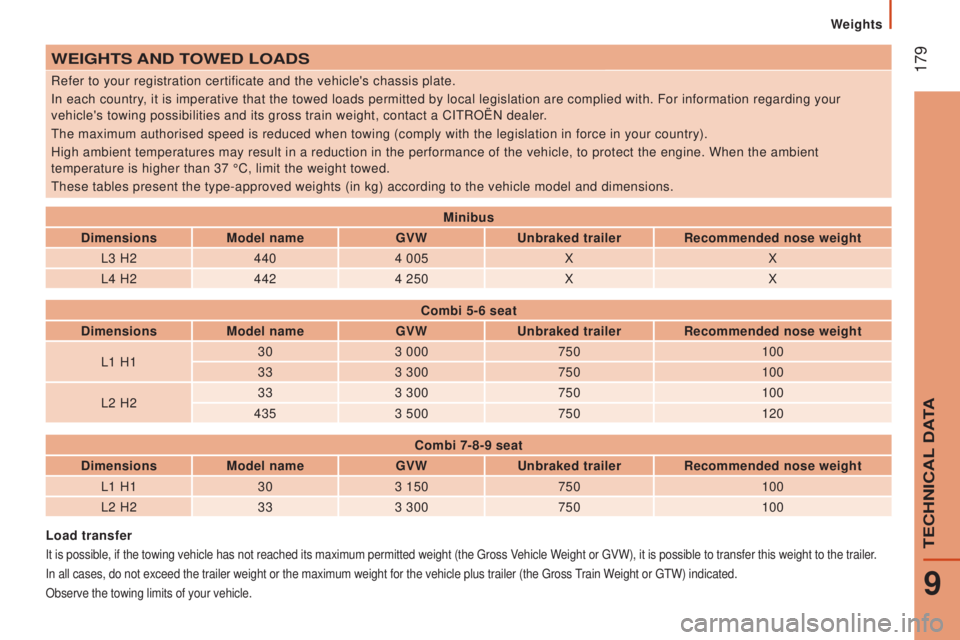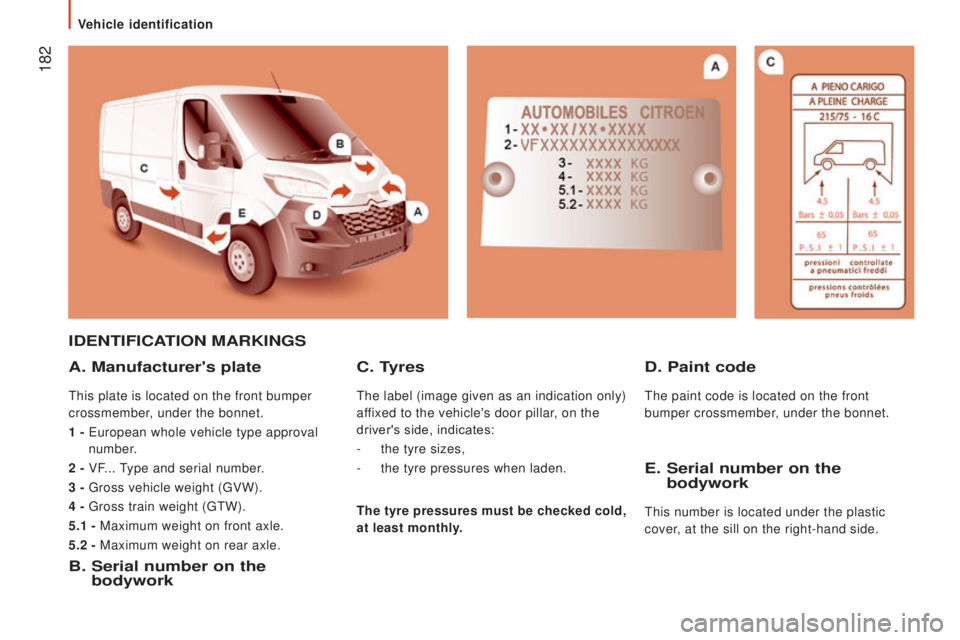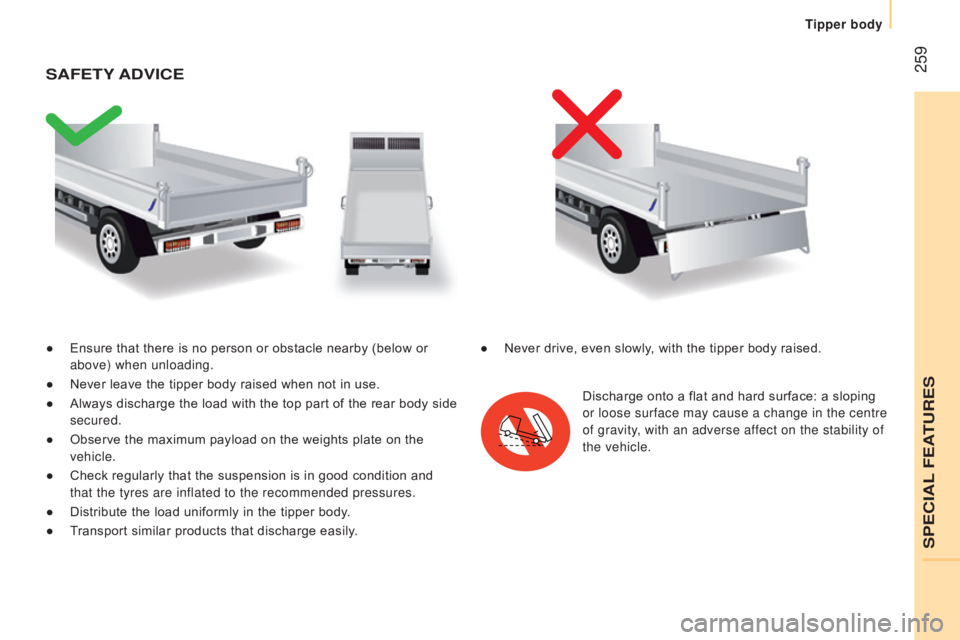weight CITROEN RELAY 2016 Handbook (in English)
[x] Cancel search | Manufacturer: CITROEN, Model Year: 2016, Model line: RELAY, Model: CITROEN RELAY 2016Pages: 308, PDF Size: 10.98 MB
Page 181 of 308

179WEIGHtS And tOWE d LOA d S
Refer to your registration certificate and the vehicle's chassis plate.
In each country, it is imperative that the towed loads permitted by local legislation a\
re complied with. For information regarding your
vehicle's towing possibilities and its gross train weight, contact a CIT\
ROËN dealer.
The maximum authorised speed is reduced when towing (comply with the le\
gislation in force in your country).
High ambient temperatures may result in a reduction in the performance o\
f the vehicle, to protect the engine. When the ambient
temperature is higher than 37 °C, limit the weight towed.
These tables present the type-approved weights (in kg) according to th\
e vehicle model and dimensions.
Load transfer
It is possible, if the towing vehicle has not reached its maximum permit\
ted weight (the Gross Vehicle Weight or GVW), it is possible to transfer this weight to the trailer.
In all cases, do not exceed the trailer weight or the maximum weight for\
the vehicle plus trailer (the Gross Train Weight or GTW) indicated.
Observe the towing limits of your vehicle.
Minibus
d
imensions Model name GVW
u
nbraked trailer
r
ecommended nose weight
L3 H2 4404 005 X X
L4 H2 4424 250 X X
c
ombi 5-6 seat
d
imensions Model name GVW
u
nbraked trailer
r
ecommended nose weight
L1 H1 30
3 000 750 100
33 3 300 750 100
L2 H2 33
3 300 750 100
435 3 500 750 120
c
ombi 7-8-9 seat
d
imensions Model name GVW
u
nbraked trailer
r
ecommended nose weight
L1 H1 303 150 750 100
L2 H2 333 300 750 100Weights
9
TECHNICAL DATA
Page 182 of 308

180Va n
d
imensions Model name GVW
u
nbraked trailer
r
ecommended nose weight
L1 H1 28
2 800 750 100
30 3 000 750 100
33 3 300 750 100
35 3 500 750 100
435 3 500 750 120
440 4 005 750 120
L1 H2 30
3 000 750 100
33 3 300 750 100
35 3 500 750 100
L2 H1 30
3 000 750 100
33 3 300 750 100
35 3 500 750 100
435 3 500 750 120
L2 H2 30
3 000 750 100
33 3 300 750 100
35 3 500 750 100
435 3 500 750 120
440 4 005 750 120
Weights
Page 183 of 308

181Va n
d
imensions Model name GVW
u
nbraked trailer
r
ecommended nose weight
L3 H2 33
3 300 750 100
35 3 500 750 100
435 3 500 750 120
440 4 005 750 120
L3 H3 33
3 300 750 100
35 3 500 750 100
435 3 500 750 120
440 4 005 750 120
L4 H2 435
3 500 750 120
440 4 005 750 120
L4 H3 435
3 500 750 120
440 4 005 750 120Weights
9
TECHNICAL DATA
Page 184 of 308

182
IdEntIFIcAtIO n MA r KI n GS
A. Manufacturer's plate
This plate is located on the front bumper
crossmember, under the bonnet.
1 -
European whole vehicle type approval
number.
2 - VF... Type and serial number.
3 - Gross vehicle weight (GVW).
4 - Gross train weight (GTW).
5.1 - Maximum weight on front axle.
5.2 - Maximum weight on rear axle.
B. Serial number on the
bodywork
d
. Paint code
The paint code is located on the front
bumper crossmember, under the bonnet.
c. tyres
The label (image given as an indication only)
affixed to the vehicle's door pillar, on the
driver's side, indicates:
-
the tyre sizes,
-
the tyre pressures when laden.E. Serial number on the
bodywork
This number is located under the plastic
cover, at the sill on the right-hand side.t
he tyre pressures must be checked cold,
at least monthly.
Vehicle identification
Page 261 of 308

259
● Ensure that there is no person or obstacle nearby (below or
above) when unloading.
●
Never leave the tipper body raised when not in use.
●
Always discharge the load with the top part of the rear body si
de
secured.
●
Observe the maximum payload on the weights plate on the
vehicle.
●
Check regularly that the suspension is in good condition and
that the tyres are inflated to the recommended pressures.
●
Distribute the load uniformly in the tipper body
.
●
T
ransport similar products that discharge easily.
SAFEtY A d VI c E
Discharge onto a flat and hard surface: a sloping
or loose surface may cause a change in the centre
of gravity, with an adverse affect on the stability of
the vehicle.
●
Never drive, even slowly
, with the tipper body raised.
SPECIAL FEATURES
Tipper body
Page 264 of 308

262
WEIGHtS And tOWE d LOA d S ( KG )
For more information, refer to your registration certificate.
In each country, it is imperative that the towed loads authorised by
local legislation are complied with. To find out your vehicle's towing
capacities and its gross train weight, consult a franchised dealer.
The maximum authorised speed is reduced when towing (comply
with the legislation in force in your country).
With load transfer, the braked trailer weight can be increased,
on condition that the equivalent of this load is removed from the
vehicle so that the GTW is not exceeded. Warning: towing with a
lightly loaded towing vehicle may have an adverse effect on its road
holding.
The GTW and towed load values indicated are valid up to a
maximum altitude of 1000 metres; the towed load mentioned must
be reduced by 10 % for each additional 1000 metres.
High ambient temperatures may result in a reduction in the
performance of the vehicle in order to protect the engine; when the
ambient temperature is higher than 37 °C, limit the towed weight.
The kerb weight is equal to the weight without load + driver (75
kg) +
fuel tank filled to 90%. Before towing a trailer, check
that:
-
the nose weight on the
towbar ball does not exceed
the value (S) indicated on
the trailer's weights plate,
-
the maximum trailer weight
is less than the value
indicated on the trailer's
weights plate and the Gross
Vehicle Weight (GVW)
does not exceed the value
indicated on the vehicle's
weights plate.
-
in the case of a self-
supporting trailer
, the Gross
Train Weight must not
exceed the value indicated
on the vehicle's weights
plate.
General points
Tipper body